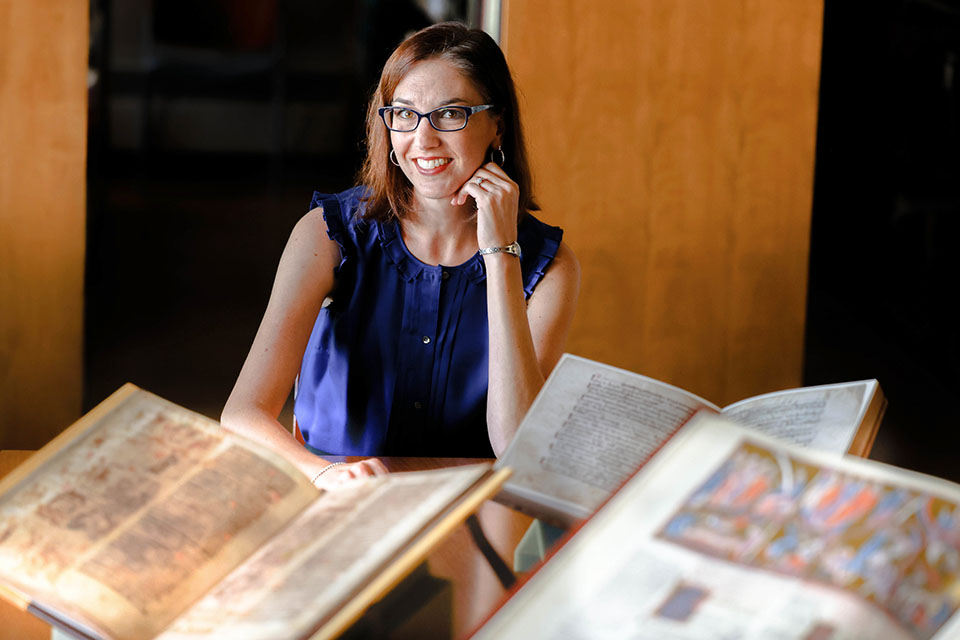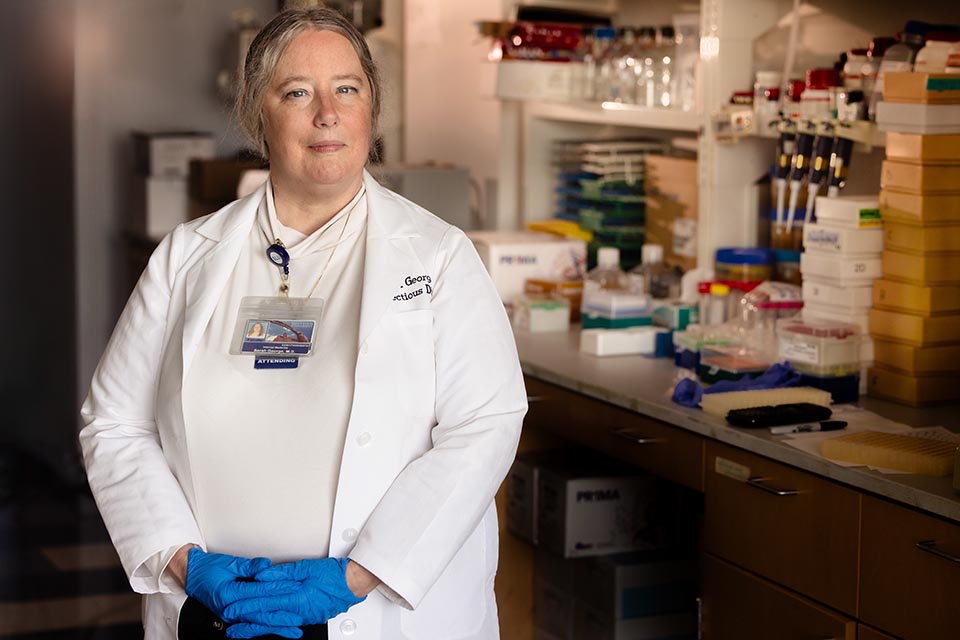Bringing Medieval Humanities Into the 21st Century: SLU Research Team Receives NEH Grant to Update Humanities Software
01/09/2024
ST. LOUIS – A team of researchers from Saint Louis University has been awarded a Digital Humanities Advancement Grant through the National Endowment for the Humanities (NEH). The three-year grant is for $349,907 and will fund the revamp of an internationally recognized manuscript transcription program founded 10 years ago at SLU. The team also qualified for $50,000 in NEH matching funds based on a commitment from SLU’s Research Institute, bringing the project total to $449,907.
The principal investigator on the project is Atria Larson, Ph.D., associate professor of Medieval Christianity at Saint Louis University. Senior personnel Patrick Cuba and Bryan Haberberger of SLU’s Research Computing Group will perform the development work.

Atria Larson, Ph.D, associate professor of Medieval Christianity, is the principal investigator on an NEH grant to fund the revamp of an internationally recognized t transcription program founded 10 years ago at SLU. Photo by Sarah Conroy.
TPEN, or Transcription for Paleographical and Editorial Notation, aids humanities scholars worldwide by producing manuscript transcriptions and mapping the text to the region where it originated.
TPEN is a well-established and internationally utilized free program for manuscript transcription. It has been used to transcribe and export texts line-by-line to prepare editions and publications of texts in numerous languages central to humanities scholarship.
“Any scholar can transcribe text from a manuscript in a program like Microsoft Word. What TPEN does is allow line-by-line transcription that can be saved and exported for a variety of uses and always links the textual transcription to an image of that portion of the original artifact,” said Larson.
The grant will fund an overhaul of the program to accommodate new features requested by users. One visible change will be new interfaces and integrations on the site.
“The interfaces used for managing teams, transcribing documents, and organizing manuscripts will be made more flexible,” Cuba said. “For example, groups of collaborators will be able to organize multiple roles, transcription annotations can cover more types of documents, and manuscripts may now have layers of annotations for music, translation, markup, commentary, etc.”
Cuba said the new integration will make it easier for external developers to create custom modules for their own organizational projects.
“Currently TPEN works best when manuscripts have long straight lines like modern, printed books. But handwritten manuscripts can be messy,” Larson said. “What I am most excited about in the TPEN upgrades is that it will be able to accommodate the complex layout of many more real textual artifacts, allowing us to capture digitally things like charts, diagrams, and marginal notes and to establish relationships between different layers of texts, such as the original text and subsequent levels of gloss annotations on it.”
Larson speaks from experience. She used TPEN in a previous NEH-funded research project. Her “Gallery of Glosses” project, which allows users to identify and transcribe annotations and marginalia in medieval manuscripts, received NEH funding in 2022.
A gloss is a word, phrase, or extended commentary inserted in a text’s margin to explain a part of the original text. Studying the glosses provides a deeper understanding of the original text and the meaning it holds for people when they read it.
Cuba and Haberberger will perform the technical work of updating TPEN, while Larson will aid in the user experience using various text, images, and diagrams in manuscripts.
“This is the beginning of a community of contribution and growth on this platform,” Cuba said.
The TPEN project is one of 260 humanities projects funded in the NEH’s first round of grants for the fiscal year 2024. The NEH supports vital humanities research, education, preservation, and public programs.
“We are delighted that the NEH recognized the potential in upgrading TPEN and we look forward to making this valuable tool even better,” Larson said.
The Digital Humanities Advancement Grants program (DHAG) supports innovative, experimental, and/or computationally challenging digital projects, leading to work that can scale to enhance scholarly research, teaching, and public programming in the humanities. The program also supports research that examines the history, criticism, ethics, and philosophy of digital culture or technology and its impact on society.
National Endowment for the Humanities
Created in 1965 as an independent federal agency, the National Endowment for the Humanities supports research and learning in history, literature, philosophy, and other areas of the humanities by funding selected, peer-reviewed proposals from around the nation. Additional information about the National Endowment for the Humanities and its grant programs is available at www.neh.gov.
Saint Louis University
Founded in 1818, Saint Louis University is one of the nation’s oldest and most prestigious Catholic institutions. Rooted in Jesuit values and its pioneering history as the first university west of the Mississippi River, SLU offers more than 15,200 students a rigorous, transformative education of the whole person. At the core of the University’s diverse community of scholars is SLU’s service-focused mission, which challenges and prepares students to make the world a better, more just place.
Latest Newslink
- A Camp Friendship that Stirred Up Lifelong BondsIn the summer of 2005, Mary Kate Keenoy (Chaifetz Grad '22) and Genevieve Willman met at SLU's Gardens to Tables culinary camp. What started as a shared interest in cooking grew into a lasting friendship that has endured for two decades.
- Bruce Bacon, M.D.: 1949-2025Bruce Bacon, M.D., professor emeritus of internal medicine, died Sunday, July 6, 2025. He was 75. Bacon was known globally for his expertise in all aspects of clinical hepatology, specifically hemochromatosis, viral hepatitis, chronic liver disease / general hepatology, and liver transplant. Bacon was also a member of the research team that discovered the gene for hemochromatosis, HFE, in 1996.
- SLU Launches William L. Clay, Sr. Institute of Civic Engagement and Economic JusticeThe Clay Institute will provide immersive learning experiences and hands-on training that address the social and economic challenges facing the St. Louis region and the nation. Institute programming will be available to all students with an interest in civic engagement and democratic participation.
- SLU Research Explores Depression's Ripple Effect on DiabetesA study conducted by researchers at Saint Louis University found that patients with depression were more likely to have uncontrolled diabetes over time and that depression contributes to a heightened economic burden to diabetes management.
- SLU/YouGov Poll: Statewide Cell Phone Ban for Missouri Schools Popular with VotersGovernor Mike Kehoe has signed Senate Bill 68 into law, enacting a statewide ban on the use of personal electronic devices, including cell phones, tablets, and smartwatches, throughout the school day in Missouri public and public charter schools.
- SLU Vaccine Center Will Enroll Healthy Volunteers in Yellow Fever Vaccine Clinical TrialSaint Louis University's Center for Vaccine Development will enroll up to 70 adult volunteers in a clinical trial to study the safety elicited by a new investigational vaccine for yellow fever, a potentially deadly disease that is spread by mosquitoes. The research is funded by Sanofi Pasteur.













